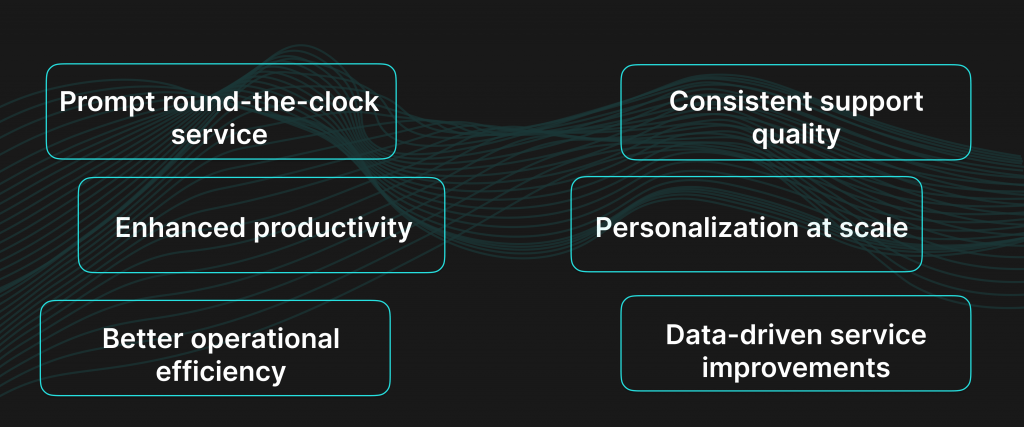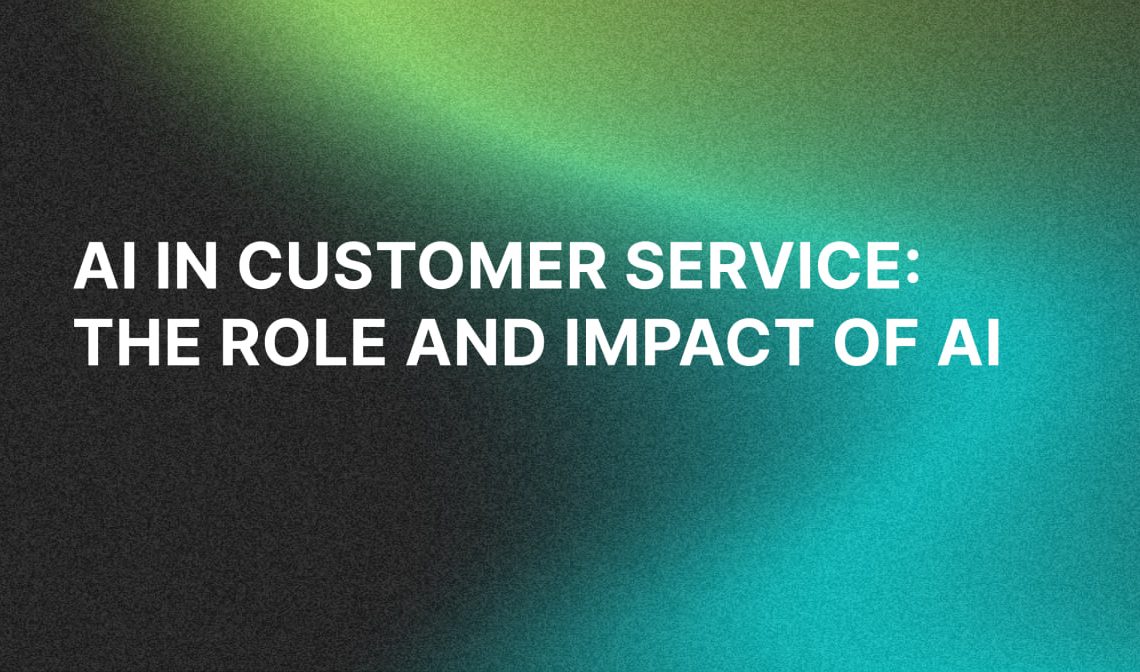Recently updated on October 3, 2025
With Gen AI making waves, today a staggering 83% of decision-makers expect artificial intelligence investment to increase over the next year. As organizations identify viable use cases, customer service stands out as an absolute no-brainer. Indeed, 84% of IT leaders believe AI will help their organizations better serve customers.
When strategically integrated, AI empowers companies to deliver superior customer experiences by equipping agents with comprehensive customer data and advanced tooling to streamline management of customer inquiries.
In this article, we discuss the role of AI in customer service, breaking down the following:
- Key Components of AI in Customer Service
- Core Benefits of AI in Customer Support
- Three Examples of AI in Customer Service
- Challenges of using AI for Customer Service
- The Future of AI in Customer Service
So, without further ado, let’s dive in.
Understanding Key Components of AI in Customer Service
AI in customer service is the utilization of intelligent technology to provide support experiences that are speedy effective and personalized.
When carefully trained and accurately implemented, AI can serve as an invaluable tool for organizations, helping them:
- Deliver a superior, more dynamic customer experience.
- Streamline customer service processes and enhance employee productivity.
- Reduce costs intelligently, boost revenue, and achieve substantial ROI.
To deliver the magic, customer service tools rely on leveraging artificial intelligence (AI) technologies like machine learning (ML) and natural language processing (NLP) to enhance and streamline customer interactions. Each plays a pivotal role in making customer interactions more efficient, effective, and engaging.
Machine Learning
Machine Learning is a potent technology in the world of customer service, powering tools that can anticipate customer needs and streamline operations. Without explicit programming, it drives systems that learn from every customer engagement, improving responses and accuracy over time.
By analyzing large volumes of customer data, ML is able to make predictions about the products a customer is likely to buy, when they may need assistance, and even how they prefer to communicate. This predictive capability empowers businesses to be proactive, providing personalized recommendations and solutions that improve satisfaction and loyalty.
Natural Language Processing
Natural Language Processing, on the other hand, is the foundational technology that powers machines to comprehend the meaning and intent behind words, improving the responsiveness and intuitiveness of customer support solutions.
The tech enables chatbots and virtual assistants to have meaningful conversations with clients by deciphering their questions and responding with precise, situation-specific information. With NLP, chatbots and virtual assistants can engage with customers in meaningful conversations, interpreting their queries and providing contextually relevant responses.
Besides, NLP can trace the sentiment behind messages, allowing companies to assess customer satisfaction levels and react to unfavorable comments with empathy. This human-like language comprehension makes NLP essential for providing smooth and personalized customer care.
Looking into the Core Benefits of AI in Customer Support

Artificial intelligence and customer service are a perfect match. And as this technology enhances the customer experience, it also delivers substantial business benefits. Here are the top advantages of integrating artificial intelligence into customer service:
1. Prompt round-the-clock service
One of the most significant benefits of AI customer service is its ability to provide prompt round-the-clock service. And a staggering 90% of customers consider it crucial to have their issues resolved promptly. Further to that, 69% of service agents reported difficulty managing speed and quality when serving customers.
While human agents need breaks and time off, an AI-powered system can operate seamlessly without interruption. This capability grants support and assistance at any time of day or night, regardless of customers’ location or time zone.
2. Enhanced productivity
The use of AI in customer service can greatly boost productivity. Routine tasks get automated, allowing customer service representatives to devote more time to complex and value-driven activities. Recent industry research shows that 63% of service professionals indicate AI as a powerful tool helping them serve their customers faster.
This is especially relevant when being faced with high support volumes. AI-based conversational assistants can increase productivity by over 14% for customer service agents.
3. Better operational efficiency
Another considerable advantage of AI in customer service is the improvement of operational efficiency. This benefit comes in many meaningful ways, as chatbots and virtual assistants have the capacity to respond to a significant amount of requests simultaneously without human intervention.

These AI tools for customer service can instantly respond to common inquiries, assist with orders, or troubleshoot basic issues, reducing the workload on human agents. Such automation results in superior employee experiences, increased engagement, and better business outcomes – up to a 50% increase in revenue, according to industry research.
4. Consistent support quality
AI-powered customer service offers a significant advantage in providing consistent support quality. Be it a website or a messenger, 75% of customers use multiple channels in their ongoing experience, making a consistent omnichannel experience a definite must.
Indeed, unlike human agents, who may be influenced by factors like fatigue, mood, or workload, AI systems operate without these limitations, ensuring that each customer interaction maintains a high standard. Since AI-powered agents can manage up to 80% of frequently asked questions, implementing an intelligent chatbot can be a game-changer.
5. Personalization at scale
Customers crave to be treated individually and recent stats from Zendesk prove it well – 88% of CX trendsetters consider personalization a top priority. And no wonder here, as 76% of customers get frustrated when their unique needs are not met.
Modern AI chatbots not only excel at resolving issues in real-time but also possess the intelligence to analyze and offer personalized suggestions. By utilizing pre-trained knowledge of clients’ behavioral patterns, smart chatbots can steer users to the best possible options, granting customized and effective support.
With AI capabilities on board, businesses can proactively anticipate client needs and future behavioural patterns, to provide personalized recommendations and value-based offers at the very right moment. Such an approach notably boosts engagement and sales, ensuring a seamless and highly responsive customer experience.
gents.
6. Data-driven service improvements
AI systems are inherently designed to improve over time. By constantly reviewing customer interactions and feedback, AI can pinpoint opportunities for improvement in service delivery.
AI-driven customer service systems can access volumes of data across multiple touchpoints, including chat logs, call transcripts, emails and social media interactions.Rather than relying on limited feedback practices, AI can analyze every customer interaction in real-time, sift through data for trends and patterns that human analysts might overlook.
For example, if some feature consistently attracts negative feedback, AI can flag this up to the support team, prompting immediate corrective action to improve the user experience.
Three Examples of AI in Customer Service
As we’ve discussed how AI can benefit both businesses and individuals, let’s briefly explore how one can implement AI in customer service.
Chatbots and Virtual Assistants
By and large, chatbots and virtual assistants stand among the most common applications of AI in customer service.They can address a wide spectrum of customer inquiries, providing instant responses and solutions to common issues. Not only does this enhance customer experience, but it also enables human agents to focus on more complex issues.
With the arrival of Natural language processing (NLP) at the high level that OpenAI is currently demonstrating, AI-powered chatbots and virtual assistants can satisfy the needs and wants of modern tech-savvy customers that expect AI to handle queries on par with humans, citing creativity, empathy, and friendliness as key traits.
Machine Learning for Feedback Analysis
The use of ML for feedback analysis, is another application of AI that fundamentally changes how companies analyze large volumes of customer feedback to elevate service quality. This advanced tech applies advanced algorithms to process massive amounts of data from multiple sources to detect trends, sentiments, and insights with high accuracy and speed.
In this respect, ML transforms data into a strategic asset, allowing businesses to move beyond reactive measures. By proactively adjusting their practices based on data-driven insights, companies can better serve their customers and maintain a competitive edge.
Additionally, the insights gained from analysis can be used to optimize products and services to better match customer preferences, thereby boosting personalization and fostering unwavering customer loyalty.
Predictive Customer Analytics
Predictive customer analytics harnesses the superpowers of AI to turn data into actionable insights that reveal customer needs and potential behaviors.
By analyzing patterns in both historical and real-time data, these AI tools empower businesses to anticipate customer interactions and tailor their offerings accordingly. The predictive aspect is critical in driving personalization, improving marketing efforts, and increasing customer retention.
With predictive analytics, businesses can deliver highly personalized customer experiences by understanding individual preferences and predicting future buying behaviors. Along with enhanced satisfaction levels, such personalization opens the door to better sales and loyalty levels – up to a 40%increase according to McKinsey.
Challenges of using AI for Customer Service
While the beneficial impact of AI on customer service is indisputable, companies may confront several challenges when deploying this tech. Therefore, to fully harness the power of AI, these challenges must be addressed.
Technological difficulties
A major obstacle is the smooth integration of AI systems into current IT infrastructures. Many organizations rely on outdated systems that were not built to accommodate AI technologies. Implementing AI often demands substantial investments in new hardware and software, as well as modifications to existing systems.
This process can be both time-consuming and costly. On top of that, companies will need skilled IT professionals to facilitate the implementation and ensure the systems are functioning properly and are fully optimized. Without proper planning, and adequate resources, AI integration may fail or turn out to be inefficient.
Data privacy and security
Another critical challenge in the deployment of AI in customer service relates to sensitive data management. Since AI requires tons of data to be collected, processed, and analyzed to produce personalized outputs, protecting data privacy and security in this regard is critical. Businesses must adhere to necessary regulations, such as the General Data Protection Regulation (GDPR) in the EU.
Failure to comply with essential regulations can lead to both legal consequences and loss of customer trust. Therefore, businesses must employ strong security measures and maintain clear and consistent communication about how they process and protect their customers’ data.
The Future of AI in Customer Service
AI has come and it is here to stay, driving significant advancements in customer service. And as AI in customer service continues to evolve, Zendesk predicts that 100% of service interactions will include AI to some degree.
According to a recent industry study, nearly 50% of CEOs underscore that growing pressure to meet evolving customer needs will speed up the use of new technologies like generative AI.
And the executives are responding to this: 79% of customer service leaders intend to invest in additional AI capabilities over the next two years. Therefore, the future of customer service is definitely AI-based, hence the AI-readiness of today will be the key factor in determining which organizations thrive in this evolving landscape tomorrow.


